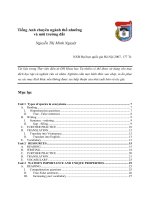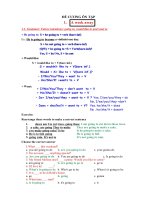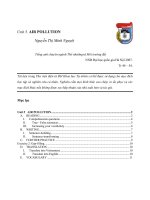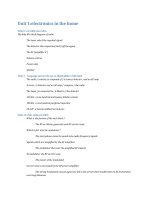ôn tập tiếng anh chuyên ngành quảng cáo và quan hệ cộng đồng
Bạn đang xem bản rút gọn của tài liệu. Xem và tải ngay bản đầy đủ của tài liệu tại đây (420.12 KB, 15 trang )
ĐỀ CƯƠNG ÔN TẬP
1. A week away
1.1 . Grammar: Future intentions: going to, would like to and want to
+ Be going to:
S + be going to + verb (bare-inf)
S + be going to + verb (bare-inf)
Ex:
He
He
is going to
is going to
become
become
a violinist one day.
a violinist one day.
S + be not going to + verb (bare-inf)
S + be not going to + verb (bare-inf)
(QW) + be going to +S + Verb(bare-inf)?
(QW) + be going to +S + Verb(bare-inf)?
Yes, S + be/ No, S + be not
Yes, S + be/ No, S + be not
+ Would like:
+ Would like:
S + would like to + V(bare inf.)
+ Want:
Exercise:
Rearrange these words to make a correct sentence
1. down am I to cut trees. going these I am going to cut down these trees.
2. a cake. are going They to make They are going to make a cake.
3. a to make going cake? Is he Is he going to make a cake.
4. He is to fall. going He is going to fall.
5. going rain. It's not to It’s not going to rain.
Choose the correct answer
1.What ___ this weekend?
a. you are going to do b. are you going to do c. your gonna do
2. I'm not sure. ___ anything special?
a. Are you going to do b. You are going to do c. Is going to do
3. My friend Melissa and I ___ a party. Would you like to come?
a. am going to b. are going to go to c. go to
4. I'd love to! ___?
a. What's it going to be b. Who's go to be c. Where's it going to be
5. It is ___ to be at Ruth's house.
a. go b. going c. gonna
6. What time ___ start?
a. is it going to b. it's going to c. it
- I/We/You/They + want to + V
- He/She/It +wants to + V
+ I/We/You/They + don’t want to + V
+ He/She/It + doesn’t want to + V
- Do+ I/we/you/they + want to + V ? Yes, I/we/you/they + do
No, I/we/you/they +don’t
- Does + she/he/it + want to + V? Yes, he/she/it + does
No , he/she/it + doesn’t
S + wouldn’t like to + V(bare inf.)
Would + S+ like to + V(bare inf.)?
7. At 10 P.M. ___ invite?
a. Who are you going to b. What you're going to c. When you going to
8. I don't know. I think ___ anyone.
a. I'm going invite b. I'm not go invite c. I'm not going to invite
Would like and want: Xem them trong sach bai tap
1.2. Grammar: Suggestions and offers
+ Suggestion with let’s, shall we, we could + verb
Suggestion Positive Negative
response response
Let’s ( = let us ) Good idea Oh, no (+ reason )
Shall we watch a video? Yes, fine Sorry, but(+reason)
We could go to a club Yes, sure
Why don’t we go on holiday? Yes, okay
+ Offers with shall I? and I’ll + verb
Offer Positive Negative
Response Response
Shall I order a pizza? Good idea! It’s Ok,thanks (+reason)
I’ll make some coffee Yes, please if that’s ok
Fine/okay/sure/thanks
That’s very kind of you
That sounds fine/ nice
Rearrange to make a correct sentence.
1. How about a coffee?
2. Shall I take your jacket?
3. Shall we ask for the bill?
4. I’ll take you home.
5. Why don’t we go to the cinema?
6. Let’s have another drink?
7. Shall I call you tomorrow?
8. Why don’t we meet at the station?
9. I’ll the tickets book.
1.3. Speaking: Weather
Asking for the weather: What is the weather like in…?
Answer: It’s + adj
How to form adjective? Noun + y (windy, cloudy)
2. Learning for the future
2.1. Grammar: Infinitive of purpose
We often use an infinitive (to + verb) to say why we do things.
e.g. She's going to Lisbon to study Portuguese.
2.2. Vocabulary and Speaking: Education and career
Học từ vựng về các môn học và các cụm động từ.
3. Keeping in touch
3.1. Grammar: Present perfect
Use of Present Perfect
puts emphasis on the result (nhan manh ket qua)
Example: She has written five letters.
action that is still going on (hanh dong xay ra trong qua khu den hien tai van con xay ra)
Example: School has not started yet.
action that stopped recently (hanh dong vua moi ket thuc)
Example: She has cooked dinner.
finished action that has an influence on the present (hanh dong da hoan tat, de lai ket qua o
hien tai)
Example: I have lost my key.
action that has taken place once, never or several times before the moment of speaking
(hanh dong da dien ra 1 hay nhieu lan tu truoc den thoi diem noi)
Example: I have never been to Australia.
Signal Words of Present Perfect
already, ever, just, never, not yet, so far, till now, up to now
For: + duration of time. For 10 years
Since: point of time, ex: since 2002
Just: close to the time of speaking, place between have and PP
Yet: not happen up to now, place: at the end of a sentence
Already: a completed action.
Form :
(+) S + have/has/ + V- ed / P.P
(-) S + haven’t/ hasn’t + V- ed / P.P
(?) Have/ Has + S+ V- ed / P.P?
TEST ON PRESENT PERFECT
Complete the table in present perfect simple.
Positive Negative Question
He has written a letter. He hasn’t written a letter. Has he written a letter?
They have stopped. They have not stopped. Have they stopped?
We have danced. We haven’t danced. Have we danced?
She has worked. She hasn’t worked. Has she worked?
Andy has slept. Andy has not slept. Has Andy slept?
Write sentences in present perfect simple.
1. they / ask / a question - They have asked a question.
2. he / speak / English - He has spoken English.
3. I / be / in my room - I have been in my room.
4. we / not / wash / the car - We haven’t washed the car.
5. Annie / not / forget / her homework - Annie hasn’t forgotten her homework.
Write questions in present perfect simple.
1. they / finish / their homework - Have they finished their homework?
2. Sue / kiss / Ben - Has Sue kissed Ben?
3. the waiter / bring / the tea - Has the waiter brought the tea?
4. Marilyn / pay / the bill - Has Marilyn paid the bill?
5. you / ever / write / a poem - Have you ever written a poem?
Ask for the information in the bold part of the sentence.
1. They have talked about art at school. - Where have they talked about art?
2. Jane has got a letter. - What has Jane got?
3. Oliver has cooked dinner. - Who has cooked dinner?
4. Caron has read seven pages. - How many pages has Caron read?
5. I have heard the song 100 times. - How often have you heard the song?
Present perfect and simple past
Form
Write down the correct form (pronoun + verb).
Simple Past Present Perfect Simple
I / open I openned. I have openned.
he / write He wrote. He has written.
they / do They did. They have done.
you / swim You swam. You have swum.
she / give She gave. She have given.
Use
When do we use which tense?
1. 'Already' is a signal word for present perfect simple
2. 'Just' is a signal word for present perfect simple
3. '2 years ago' is a signal word for simple past
4. 'Yet' is a signal word for present perfect simple
5. 'Yesterday' is a signal word for simple past
Positive Sentences
Put the verbs into the correct tense (simple past or present perfect simple).
1. Mary (win) the lottery last year.
=> Mary won the lottery last year.
2. We (prepare / already) dinner.
=> We have already prepared dinner.
3. James (find) your ring in the garden yesterday.
=> James found your ring in the garden yesterday.
4. He (come / just) home.
=> He has just come home.
5. They (buy) their car two years ago.
=> They bought their car two years ago.
Negative Sentences
Put the verbs into the correct tense (simple past or present perfect simple).
1. I (see / not) anyone yet. …haven’t seen…
2. Phil (go / not) to the cinema last night. …didn’t go…
3. We (be / not) to the zoo so far. …haven’t been…
4. She (arrive / not) yet. …hasn’t arrived…
5. Emily (visit / not) me last week. …didn’t visit…
Questions
Put the verbs into the correct tense (simple past or present perfect simple).
1. (you / read) the book yet? Have you read the book yet?
2. How many letters (they / write) so far? How many letters have they written so far?
3. When (he / tell) you that? When did he tell you that?
4. (you / be) at home last night? Were you at home last night?
5. How often (you / travel) abroad till now?
=> How often have you travelled abroad till now?
Text
Put the verbs into the correct tense (simple past or present perfect simple).
1. A: (you / taste / ever) sushi? Have you ever tasted…
2. B: Yes, I (eat) sushi at least five times so far. …have eaten…
3. A: When (you / eat) sushi for the first time? …have you eaten…
4. B: I (eat) sushi for the first time on my dad's 50th birthday. He (invite) the whole
family to a Japanese restaurant. …ate… / …invited…
5. A: (you / like) it? …did you like…
6. B: Absolutely. In fact, it (be) so good that we (be) to that restaurant three times yet.
And on my mum's birthday, we (order) some sushi and (have) it at home. …was… / …have
been… / …ordered… / …had…
3.2. Vocabulary: Ways of communicating, telephoning, Reading: Get in touch through the
ages
Chu y hoc het tu vung, cum dong tu trong bai.
4. Going places
4.1. Grammar: have to, don’t have to, can and can’t + V(bare inf)
He have to / has to stop smoking.
The he / she / it form of “have to” is HAS TO.
You can’t / don’t have to smoke in the classroom.
When it is not okay or it is prohibited to do something we use CAN’T
Fill in the blanks have to/ don’t have to/ can/ can’t
1. I can’t do it myself. I'm really too overworked.
2. We haven’t to hire a car. My uncle will lend us his.
3. He has to work harder if he wants to succeed.
4. You can’t see the Queen. She is not in London.
5. I'm not sure you can do all that in one week.
6. He can go with you. He has got plenty of time.
7. He has to/hasn’t to work all the week.
8. She can go on holidays in England.
4.2. Vocabulary: Preposition of movement
4.3. Speaking: direction
Asking for and Giving Directions
How do I get to …?
What's the best way to …?
Where is …?
Go straight on (until you come to …).
Turn back./Go back.
Turn left/right (into …-street).
Go along …
Cross …
Take the first/second road on the left/right
It's on the left/right.
straight on
opposite
near
next to
between
at the end (of)
on/at the corner
behind
in front of
(just) around the corner
traffic lights
crossroads, junction
5. Important first
5.1. Revision of Simple past:
Positive Form Negative Form Question Form
S + V-ed
S + V2
S + Didn’t + V
• Did + S + V ?
Yes, S + did
No, S + didn’t
Wh-question+ did + S + V?
Signal Words of Simple Past
yesterday, 2 minutes ago, in 1990, the other day, last Friday
Preposition:
a. Time: at
…….eight o’clock;
………12.15;
……….midnight.
b. Days/ Dates: on
…… Wednesday;
……… New Year’s Day;
…………June 14
th
.
c. Months, seasons, years, decades, centuries: in
……….June;
………….winter;
………1998;
………… the 1990s;
…… the twenty-first century.
d. Phrases with last and yesterday: no preposition
I saw him……… yesterday.
We arrived ……… last night.
They left……………yesterday morning.
I last met her …………… two years ago.
Exercise:
Put the verbs into the correct form (simple past).
1. Last year I (spend) my holiday in Ireland. spent
2. It (be) great. was
3. I (travel) around by car with two friends and we (visit) lots of interesting places.
Traveled/visited
4. In the evening s we usually (go) to a pub. go
5. One night we even (learn) some Irish dances. learnt/learned
6. We (be) very lucky with the weather. were
7. It (not / rain) a lot. didn’t rain
8. But we (see) some beautiful rainbows. saw
9. Where (spend / you) your last holiday? did you spend
Test
Write the past forms of the irregular verbs.
1. go → went
2. come → came
3. buy → bought
4. have → had
5. do → did
Complete the table in simple past.
Positive Negative Question
Jane was tired. Jane wasn’t tired. Was Jane tired?
Sean worked. Sean did not work. Did Sean work?
I had a cat. I didn’t have a cat. Did I have a cat?
Marry sang. Mary did not sing. Did Marry sing?
She saw us. She didn’t see us. Did she see us?
Put the sentences into simple past.
1. We open the door. → We openned the door.
2. You write poems. → You wrote poems.
3. Richard plays in the garden. → Richard played in the garden.
4. Kerry does not speak English. → Kerry didn’t speak English.
5. Do you see the bird? → Did you saw the bird?
Write sentences in simple past.
1. you / cards / play You played cards.
2. I / a car / want I wanted a car.
3. we / the game / lose We lost the game.
4. not / I / early / get up I didn’t get up early.
5. not / Jeff and Linda / home / cycle Jeff and Linda didn’t cycle home.
„Was“ or „Were“?
1. I were hungry.
2. You were in Australia last year.
3. She was not there.
4. Charly Chaplin was a famous actor.
5. Lisa and James were at home.
Ask for the bold part of the sentence.
1. Billy ate an apple. What did Billy eat?
2. The children played in the garden. Where did the children play?
3. Laura came home at six o'clock. When did Laura come home?
4. The boy read a book. Who read a book?
5. The girl wrote five letters. How many letters did the girl write?
Vocabulary: Words to describe feeling and wordspot: feel
Hoc cac tinh tu mieu ta cam xuc
- S (things/ people) + feel + adjective: How do you feel about your friend?
The room felt cold
- feel like + V-ing/ N: Do you feel like going for a walk?
I feel like a cup of coffee
- feel about + N, ex: How do you feel about your friend?
Xem them trong sach bai tap.
6. At rest, at work
6.1. Grammar: should/shouldn’t
Form: (+)
S + should + verb(bare-inf)
S + should + verb(bare-inf)
(-)
S + shouldn’t + Verb(bare-inf)
S + shouldn’t + Verb(bare-inf)
(?)
(QW)+should+S+Verb(bare-inf)?
(QW)+should+S+Verb(bare-inf)?
Yes, S + should/ No, S + shouldn’t.
Yes, S + should/ No, S + shouldn’t.
6.2. Vocabulary: verb phrases of daily routine
1. Get an alarm clock
A. Buy B. Set C. Switch on
2. have a light snack
A. cheap B. late-night C. small
3. ten minutes fast
A. after the correct time B. at the correct time C. before the correct time
4. Get a friend to phone you
A. Ask B. Find C. Look for
5. They say that an hour of sleep
A. people in general B. your friends C. your parents
6. It’s a great way to relax
A. big B. expensive C. wonderful
7. But avoid coffee, tea or alcohol
A. drink B. do not have C. try
6.3. Listening and speaking: making requests and asking for permission
Making requests: Could you …, please?
Asking for permission: Is it Ok if I leave….?
Can I borrow… ?
Do you mind if I change…?
7A. Special occasions
7.1. Revision of differences between Present Continuous and Present Simple
Present simple Present continuous
Form Positive S + am/is/are + O S + am/is/are + V-ing + O
S + V + O
Negative S + am/is/are not + O S + am/is/are not + V-ing + O
S + do/does not +V+O
Question Am/Is/Are + S + O? Am/Is/Are + S + V-ing + O?
Do/ Does + S+V + O?
Usage For actions which are generally
or always true
For actions which are in
progress now or around now
With phrase(s) Always, never, everyday,
usually, normally
Today, now, right now, Listen!,
Look
Present simple or present continuous??
1. Look! He (leave) the house. is leaving
2. Quiet please! I (write) a test. am writing
3. She usually (walk) to school. walks
4. But look! Today she (go) by bike. is going
5. Every Sunday we (go) to see my grandparents. go
6. He often (go) to the cinema. goes
7. We (play) Monopoly at the moment. are playing
8. The child seldom (cry) . crys
9. I (not / do) anything at the moment. am not doing
10. (watch / he) the news regularly? does he watch
TEST
Write the verbs in Present Progressive.
1. speak - I am speaking.
2. jump - you are jumping.
3. bake - she is baking.
4. play - they are playing.
5. run - we are runing.
Write the verbs in Simple Present, 3rd person singular.
1. be - it is
2. have - he has
3. eat - she eats
4. can - he can
5. wash - she washes
Use
When to use which tense?
1. For actions happening regularly, often or never, we use Simple Present
2. For actions happening now, we use present continuous.
3. The verbs 'be', 'have', 'like' and 'want' are normally only used in Simple Present.
4. The signal word 'usually' indicates that we have to use Simple Present.
5. The signal word 'now' indicates that we have to use present continuous.
Positive sentences
Complete the sentences. Use Simple Present or Present Progressive.
1. Look! They (leave) the house. are leaving
2. Brian (cycle) 30 km every day. cycles
3. Samantha (do) her homework at the moment. is doing
4. My parents (shop) right now. are shopping
5. He usually (get up) early in the morning. gets up
Negative sentences
Complete the sentences. Use Simple Present or Present Progressive.
1. You (see / not) her every day. don’t see
2. The baby (sleep / not) at the moment. isn’t sleeping
3. I (read / not) a book now. am not reading
4. We (go / not) to school on Sundays. aren’t going
5. He (watch / not) the news every day. doesn’t watch
question
Complete the sentences. Use Simple Present or Present Progressive.
1. (you / go) on holiday by plane sometimes? Are you going
2. (they / play) computer games every day? Do they play
3. (she / eat) dinner at the moment? Is she eatting
4. What (they / do) right now? What are they doing
5. (she / visit) her grandma very often? Does she visit
Text
Sieh dir das Bild von Jenny an und ergänze die sentences (Simple Present oder Present
Progressive).
1. Look! Jenny (go) to school. is going
2. On her back, Jenny (carry) her school bag. Is carrying
3. The school bag (be) very heavy. is
4. Normally, Jenny (wear) black shoes, but today she (wear) red wellies. Wears/is wearing
5. And look, she (wear) a raincoat because it (rain) outside. Is wearing/is raining
6. Jenny (not / want) to get wet. Don’t want
7.2. Vocabulary: Days and special occasions (hoc tu vung, ngay thang cua ngay le)
+ wordspot: day
The day before yesterday a day off Have a good day
Everyday Go out for the day bad day
Six days a week one day The day after tomorrow
all day The other day twice a day
7.4. Revision of comparative and superlative adjectives
Adjective Comparative Superlative
1 syllable young
tall
younger
taller
the youngest
the tallest
2 syllables ending
in -y
heavy
pretty
heavier
prettier
the heaviest
the prettiest
2/3 or more
syllables
sophisticated
elegant
more sophisticated
more elegant
the most sophisticated
the most elegant
Irregular forms good
bad
better
worse
the best
the worst
Fill in the correct form of the words in brackets (comparative or superlative).
1. My house is (big) than yours. bigger
2. This flower is (beautiful) than that one. more beautiful
3. This is the (interesting) book I have ever read. most interesting
4. Non-smokers usually live (long) than smokers. longer
5. Which is the (dangerous) animal in the world? most danger
6. A holiday by the sea is (good) than a holiday in the mountains. better
7. It is strange but often a coke is (expensive) than a beer. more expensive
8. Who is the (rich) woman on earth? most rich
9. The weather this summer is even (bad) than last summer. worse
10. He was the (clever) thief of all. most clever
1. It's (good) whisky I've ever tasted. the best
2. What's (long) river in Europe ? the longest
3. How slow you are !Try to be a little (quick). quickly
4. The (good) things in life are free. the best
5. The Nile is (long) than Mississippi. longer
6. Staying at a hotel is (comfortable) camping. the most comfortable
7. Teaching should be one of (gratifying) jobs. the most gratifying
8. France is (big) than Switzerland. bigger
9. It's (easy) of the two exercises. the easiest
10. What I like (good) in the film is the end. the best
7.5. Word spot: Look
a.You can see your mini-dictionary to look up any words you don’t know.
b. Who’s going to look after your dog while you’re away on holiday?
c. There was a very strange looking man watching us so we ran away as fast as we could.
d. Everyone is really look round to your visit.
e. Look at this website – it’s got some brilliant photos.
f. Tell me the truth. Do you think I look good in this new dress?
g. Have a look. There’s a car coming!
h. Will you help me look for my keys? I can’t find them anywhere.
Complete the sentences in practice 3- page 47
Succeed to you!!!









